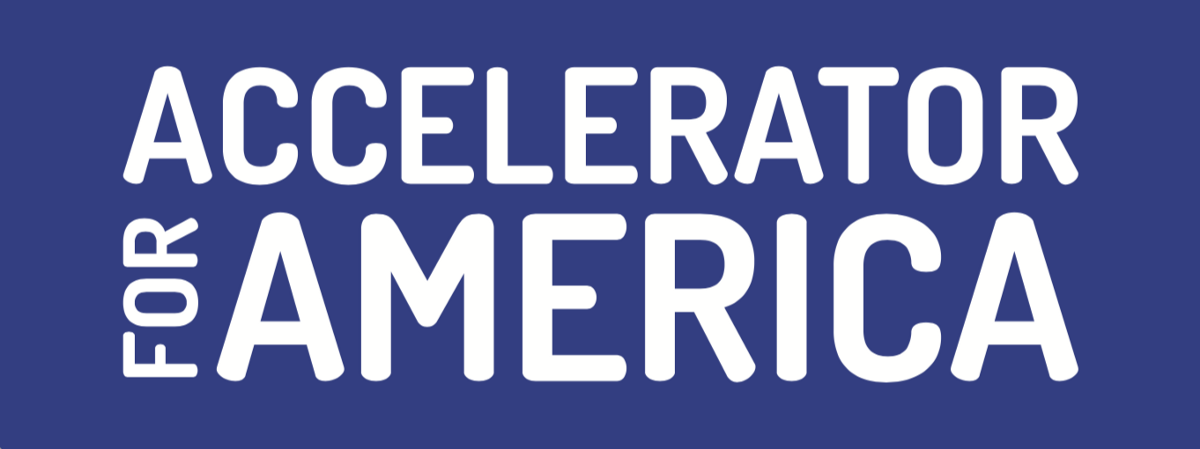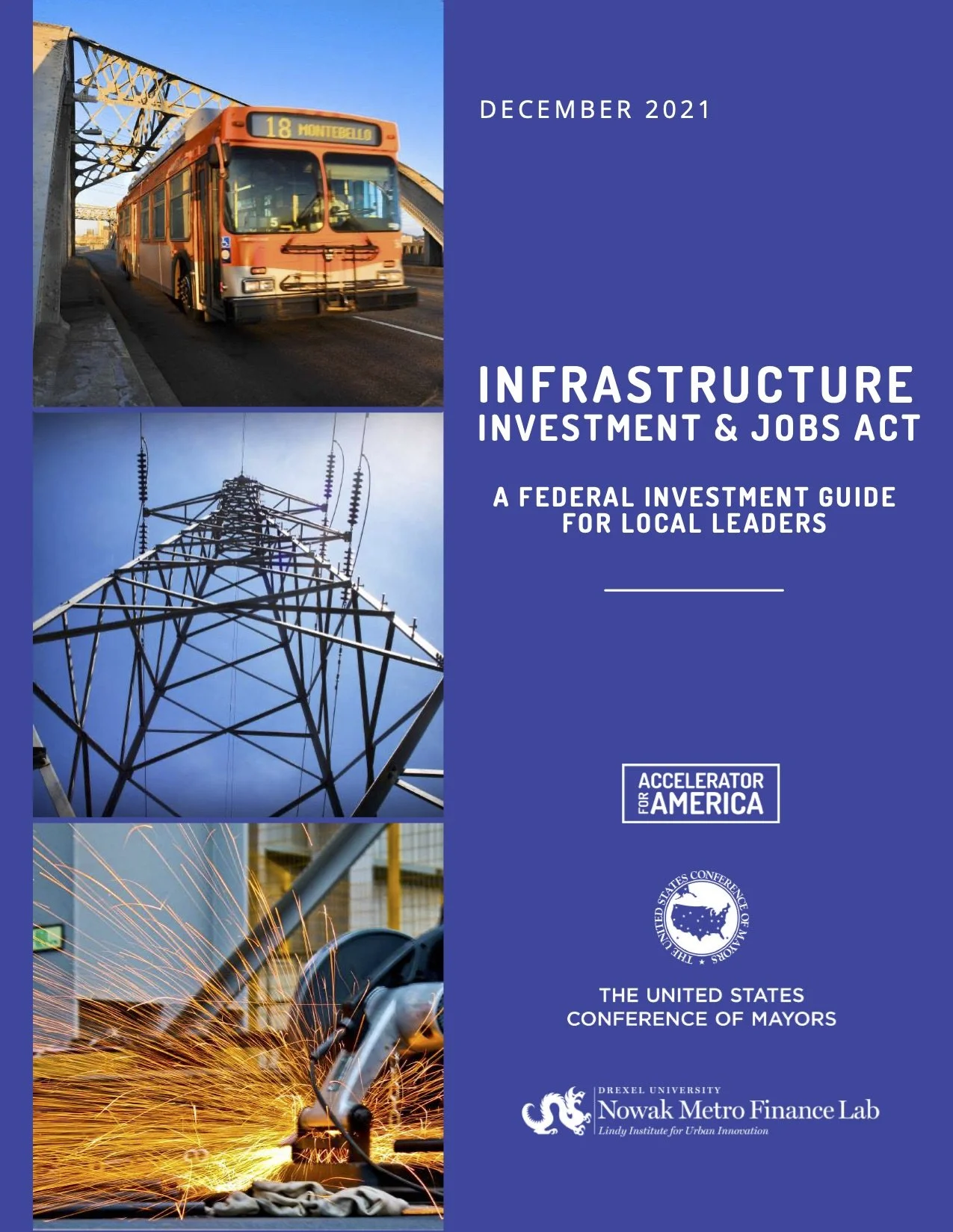WHAT WE DO
OUR WORK – CASE STUDIES
Accelerator for America is a recognized center of excellence and trusted resource in our two founding focus areas of economic development and transit and infrastructure; we bring together the public, private, philanthropic, non-profit and academic sectors to achieve ground level results.
We engage in the hands-on work of building capital stacks, identifying funding partners, advising project owners and ballot campaigns, and otherwise ‘unsticking what’s stuck’ to advance opportunity for disinvested communities.
In short, we serve as the critical intermediary, bringing essential resources to bear in solving the most challenging problems that hinder economic mobility and community building.
INNOVATIVE FINANCING MODELS FOR CORONAVIRUS RECOVERY
The Innovative Finance Playbook is the product of a multi-year collaboration between Blueprint Local, the Nowak Metro Finance Lab at Drexel University and the US Economic Development Administration (”EDA”). This was an ambitious undertaking born out of the pandemic, to rethink how capital reaches entrepreneurs, address the inequities laid bare by the Paycheck Protection Program and other emergency interventions in reaching underserved and most effected entrepreneurs, and go back to the drawing board to redesign capital products and support systems that better reach the many underserved entrepreneurs untouched by traditional banking and financial services. The final product released this week involved and reflects countless conversations with dozens of funders and founders, all aimed to remake how entrepreneurs access capital.
averting a lost decade: Rethinking an inclusive recovery for disadvantaged neighborhoods
This paper provokes a deeper discussion about more ambitious interventions that cities must design and deliver to spark an inclusive long-term recovery, particularly absent the arrival of federal funding for structural investments in housing, childcare, or higher education. Low-income neighborhoods face a series of super-sized challenges post-crisis that demand the strategic, coordinated deployment of public, private and philanthropic resources. Unless major structural changes are made, at all levels of government and across multiple sectors, the nation runs the risk of a lost decade, followed by a lost generation, with racial wealth disparities that are greater and neighborhoods that are worse off than the period that preceded the pandemic.
NATIONAL INCLUSIVE METRO RECOVERY PLAYBOOK
The COVID-19 crisis is our nation's greatest economic shock since the Great Depression. It is landing hardest on small businesses, the heart of local economies, and community life. The pandemic has reminded us of the outsized role small businesses play in our economy, employing 47% of the U.S. workforce, generating two-thirds of new jobs, and serving as a critical path to economic self-sufficiency. The pandemic has revealed not only the fragility of many of these enterprises but also the profound deficiencies in how they are supported by federal policies, private practice, and local action.
The COVID-19 crisis has devastated Main Street small businesses across America. Since February 2020, almost a quarter of all U.S. small businesses have closed at least temporarily. In the hardest-hit sectors, like restaurants, hotels, and retail, the numbers are far higher. In September 2020, Yelp reported that for businesses on its platform, more than half (60%) of closures were permanent. Womply has estimated that 185,000 small businesses — one in seven nationally — had shut down permanently by the end of August 2020. Those closures have left millions of Americans out of work and transformed lively neighborhoods around the country into retail ghost towns, destroying the wealth built by many families over generations in the process.
gold standard playbook for workforce development
As $1.2 trillion of federal infrastructure dollars begin to flow from the Bipartisan Infrastructure Law, local government "project owners" face a lack of trained workers, impacting their ability to start and complete projects on time. At the same time, these local leaders and the communities they represent continue to grapple with the ongoing hollowing of the middle class.
Our “Gold Standard” Playbook presents solutions to this challenge, and helps localities meet new requirements to qualify for federal infrastructure funds -- for example "delivering 40 percent of the overall benefits of relevant federal investments to disadvantaged communities.”
american rescue plan: Federal investment guide
In the report — created together with the U.S. Conference of Mayors, the Drexel University Nowak Metro Finance Lab, and the Mastercard Center for Inclusive Growth — we provide a guide to federal funding in the ARP. We place a special emphasis on formula funds received by local anchors, competitive grants, and funds distributed to public authorities that city leadership can leverage to boost their recovery. We clarify which entities are responsible for applying for grant funds, when funding expires, and what role city and county leadership can play even when they will not be the primary applicant for funds.
We envision this guide as a starting point and look forward to working with cities as they deploy ARP funds, innovate, iterate, and strive to achieve equitable outcomes for individuals, small businesses, and communities hit hardest by the pandemic.
INFRASTRUCTURE INVESTMENT & JOBS ACT: FEDERAL INVESTMENT GUIDE
With the passage and signing of the Infrastructure Investment and Jobs Act (IIJA) on November 15th, Accelerator aims to aid Mayors and local governments in navigating and prioritizing what the federal government has provided them. We’ve partnered with the US Conference of Mayors and the Drexel University Nowak Metro Finance Lab to release “The Infrastructure Investment and Jobs Act: A Federal Investment Guide for Local Leaders.”
California Transportation Infrastructure Landscape Report
This Landscape Report is meant to guide investments being made by philanthropic organizations, project owners, contractors, and unions interested in infrastructure and workforce development efforts across California. Through a combination of expert interviews with labor unions, project owners, labor cost estimators, and construction contractors, along with research and analysis of publicly available documentation, this report provides a view of the transportation infrastructure landscape in the state.









